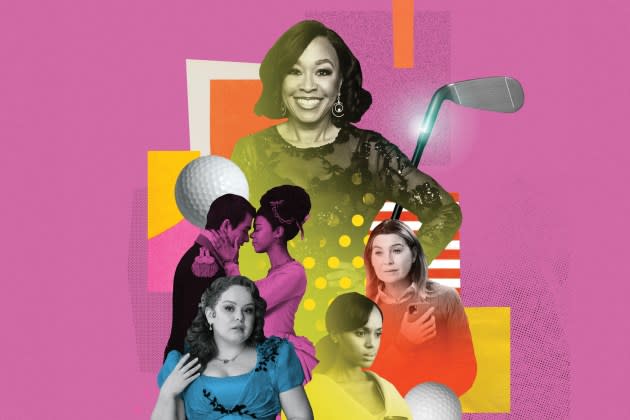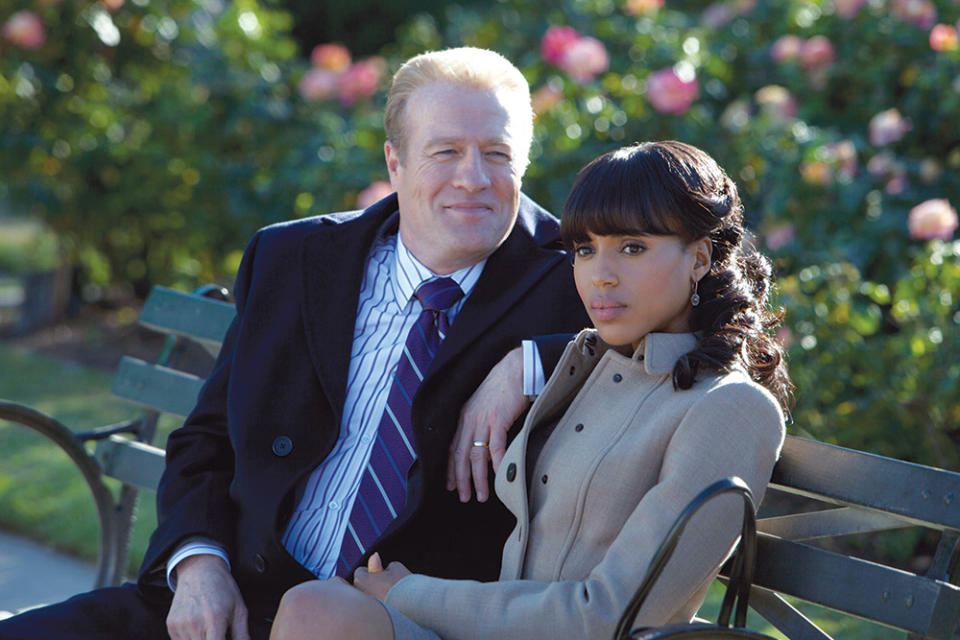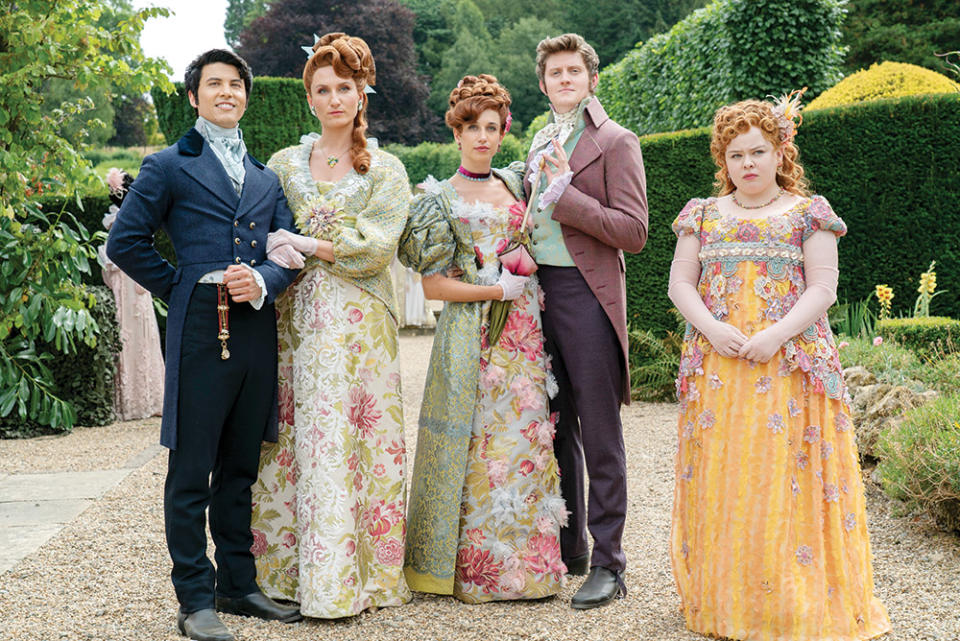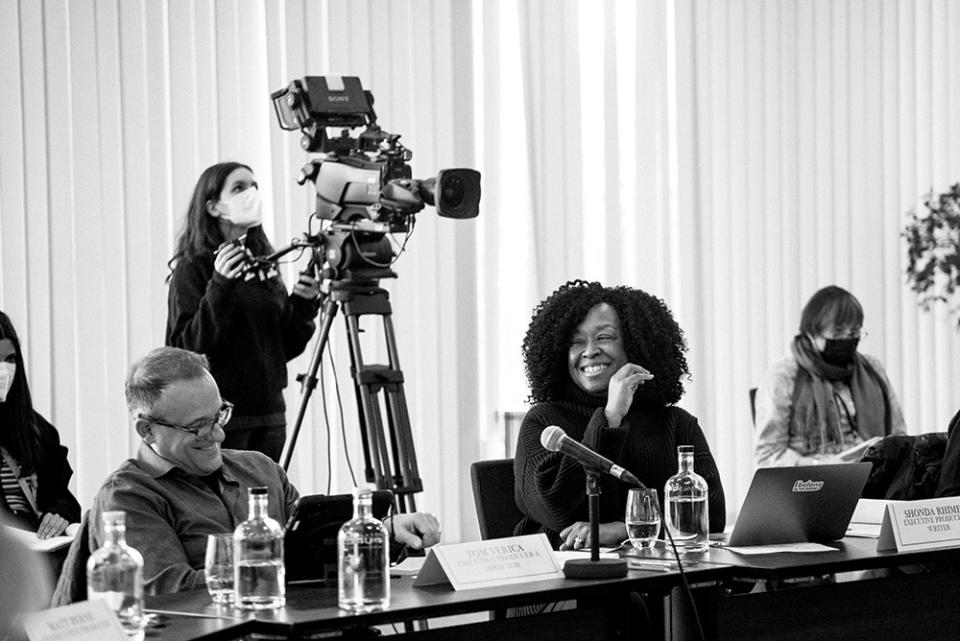Shonda Rhimes Plans to Return to Her TV Roots — She Just Hasn’t Told Netflix Yet

Shonda Rhimes never really liked Los Angeles. Every time she’d walk outside her door, it increasingly felt like someone might want something from her. “It felt like I could give everybody I met a job — every waiter, every everybody,” says the prolific creator of juggernauts including Grey’s Anatomy, Scandal and, most recently, Bridgerton. In fact, it got so bad that Rhimes was barely leaving her house.
Then the pandemic hit, and TV’s most powerful showrunner realized that she didn’t need to stick around. So, the single mother of three picked up and moved to the East Coast, where she claims she’s never been healthier or happier. Suddenly, the Netflix-based face (and brains) of the Shondaland empire of shows, events, podcasts and products wasn’t working 14-hour days. In fact, the move enabled the kind of boundaries that Rhimes had never allowed herself before.
More from The Hollywood Reporter
'Bridgerton' Showrunner Says Season 4 Will Be "Some of My Best Work" as She Confirms 2-Year Wait
Nicola Coughlan, Luke Newton Are Ready for Even Spicier Polin in 'Bridgerton' Season 3, Part 2
“If I say I’m not available, I trust everybody else to figure it out — and for a long time, I don’t think they trusted themselves to figure it out,” she explains. “But it became a necessity, so everybody’s much more autonomous now and it’s great.”
With more Bridgerton and a Black Barbie doc forthcoming, The Hollywood Reporter’s TV Titan opens up about her surprising new obsession, her cover-shoot meltdown and the type of show that she’s eager to do next.
There was a point prior to Queen Charlotte where you were supposedly telling people who worked with you that you were going to retire. What was that about?
Yeah, I said it a lot to my agent, and I’d say it to Chris [her chief marketing officer]. They were worried, I think. But I was just so burnt out.
Would that really appeal to you?
No. Doing nothing would’ve made me insane. Also, I’m not satisfied creatively if I’m not writing.
When it comes to navigating the harder or lonelier parts of this business, who, excluding those on your payroll, do you turn to?
J.J. Abrams is often the person I call. I’m really close with his wife and became friends with him that way. But I don’t have a lot of friends in the industry that I really know and feel comfortable with. I was always way too much of an introvert, and I was working too hard and putting everything else off. You read [her book] Year of Yes. It’s been a process.
So, when do you call J.J.?
I went through a phase where I thought I wanted to direct. I called J.J. and I was like, “Tell me all about your experience.” And we had long talks about it, and in those long talks, J.J. was ecstatic about the concept of writing and directing, and I realized, this is literally the last thing I want to do.
Why is that?
Because I couldn’t be off writing another project or running a room. I’d have to be directing all day. And honestly, that’s not the fun part for me. I absolutely love writing a script, and I always say that I put it in one side of the factory and it comes out the other, and then I get it back and I love to see what the actors did with it. I don’t need to determine what they’re doing with it. It’s also really good for my children that I’m not on set all the time.
You’ve said that being on set tends to complicate things.
When I’m on set, I’m the only person not working because the scripts have already been written and they’re shooting whatever they’re shooting. I’m waiting for it to come out the other side. So, I’d go to set, and everybody gets really nervous. That started to happen on maybe the third season of Grey’s. I’d say something like, “Oh, the walls are blue,” and literally they’d be like, “Shonda doesn’t like the walls.” Then someone would come over, like, “Here are five other palettes!” So, I learned that if I was going to set, the only thing I should do was walk through and say very loudly what a great job everybody was doing and leave.
Have you gotten comfortable with that lionized status?
Here’s how I think of it: Shonda Rhimes is the brand, so when I walk in, they’re not seeing me. They’re seeing everything I’ve ever done, and they’re making assumptions about that. I’m like, “I just want to come and hang out; I’m not interested in exerting any power unless something’s going horribly wrong.” So, it’s hard, and I try really hard to make everybody comfortable, but then I also realize that the time it takes to make everybody comfortable is also just exhausting for them and for me. Also, a good leader lets the people they’ve put in charge lead. They don’t need to be liked. Wait, I just thought of the other person I call: Kerry Washington.
When do you call her versus J.J.?
OK, I’m going to tell the story. Kerry and I talk about all things industry and politics and whatever, but one day, I was doing a magazine cover. This was years ago, and I arrived and they had disregarded everything my stylist had said. I don’t wear heels; all the heels were stilettos. I wear this size; they had everything two sizes smaller. It was that kind of thing. And I’m not a person who wants to be photographed in the first place, so I felt awful. I was sobbing. “I can’t do this, they’re mean,” the whole thing. So, I called Kerry, and she was on set directing, this was after Scandal, and she stopped the set and came and talked to me.

What did she say in that moment?
She said, “You’re valuable, and what you think matters.” Because I’m always like, “This is the assignment, this is what I’m supposed to do,” and she’s like, “Well, the assignment needs to adjust to you. Pick your favorite clothes, take them to the shoot and demand to wear them.” What she did was empower me.
You try to prepare every new cast for the deluge of attention that may come. And you’ve recruited Kerry to help there, too, no?
Kerry was somebody I enlisted when we started Station 19. I’m like, “Talk to the number ones [on the call sheet] to help them learn how to be a number one,” because Kerry is literally the best number one in the business. Then Betsy [Beers, Rhimes’ producing partner] or I always have the conversation of, “This show could be big. Here’s when you should call us if you’re feeling unsafe,” because people invariably get stalked and strange stuff happens. You need to know it’s coming because it’s horrifying when you don’t.
How exactly do you advise them?
Well, we have Shondaland people who give really great media training because that’s super important. I was traumatized by the whole thing when it happened to me. So, I give them my tips, which are, like, answer the question you want to answer, not necessarily what they ask you. I also try to explain that people are no longer seeing you. They’re seeing a story they can tell about you.
After the 2007-08 writers strike, you acknowledged the forced break was a bit of a relief for you. Did it feel similar in 2023?
No. The last time I was trying to run two shows at a time and I was at work 16, 18 hours a day because I was sure Grey’s was going to fail and I was sick as a dog. This time, I wasn’t like, “Yay, I get a break.” I really wasn’t. I was actually a little bit frustrated that we had to go through this again, and so many people I knew were [suffering from] the contractions that were brutal. So, I didn’t write [a thing] during the strike. I just hung out and tried to be on strike with everybody else. And that was hard for the people who worked around me, but I also think it was necessary. We’re a writer-driven company, we’re not crossing picket lines. So, no, it wasn’t like a renewal for me.
At one point, you said you were “waiting for people to say you made the first big deal that had people moving into streaming and therefore this [strike was] partially your fault.” Did it ever happen?
No, thank God. And I was sure it was the thing everybody was thinking when they looked at me. I started the stampede over to the other side. Obviously I’m narcissistically thinking of myself as the center of the process, as we all do — so, it’s not real, but I felt it anyway. I can feel guilty about almost anything.
As you noted, a lot of showrunners followed you to Netflix, but few, if any, have found the same success. Some, like Ryan Murphy, have since left. What have you figured out that others didn’t?
It’s worked so well for me because they kept their promise. I literally said, “I don’t want anybody bothering me. I just want to make shows.” And Ted [Sarandos] was like, “Great.” And he’s stayed true to that, and because he did, it’s made me more collaborative and more interested in hearing what they have to say. I want to please them. So, I’m happy when their numbers are great because I know that that’s important to them. I can’t speak to anyone else’s experience.

In the months since, there have been cuts and contraction across the industry. Have you felt either?
No, but also, we’re not trying to spend a billion dollars. We’re not those people. Like, on Bridgerton, I’m very budget-conscious. We could do anything, but I want us to be responsible because we want to go for a long time.
What gets a no at Netflix?
For Shondaland? I don’t think there’s anything that doesn’t get made at Netflix. I mean, if I’m doing something, they’re excited about it. It doesn’t matter what. But we’ve brought them things from other writers before, and they’ve just been like, “We don’t understand the genre or what you’re trying to do.” And though I could be like, “I think it could be great,” at a certain point, you go, “They don’t get it and we don’t need to make them get it.”
If you talk to writers in town, they’ll tell you that they’re being told to pitch these platforms “the next Grey’s Anatomy.” OK, you’re already rolling your eyes …
Because what I think they’re talking about is something eminently watchable and that will last forever, but how are you supposed to know that when you make a show? And it also makes it sound like they should be imitative of Grey’s Anatomy. ABC did that a whole bunch, and it never worked. So, have at it! But what I also hear is that they’re wanting more procedural shows, more case-of-the-week, and, honestly, I’ve been thinking about that a lot, too. I miss getting to make shows that way. I miss getting to tell those kinds of stories because it was fun, and I was good at it, and I loved the idea of these long-term relationships with actors. We make a Bridgerton, and it’s like 18 months before we see anybody again. I miss the family that Scandal was. I also just miss that kind of storytelling.

So, is there anything in your pipeline that fits that bill?
I do have an idea that I think would be kind of great. I haven’t told Netflix about it yet because it’s not fleshed out enough in my head, but I’m really leaning toward it. And I’m also leaning toward doing a single episode of something, taking three weeks off, evaluating it, pilot-style, and then going back in. You get to see what works and what doesn’t.
What is your involvement in Grey’s Anatomy at this point?
I flew in to have a chat with the actors as we ended this season just to see how they were doing and to talk about what’s coming up. But I let Krista [Vernoff] run that show, and now I’m letting Meg [Marinis] run that show. She’s been there since the beginning, so I’m not trying to take over or micromanage her. And for a long time, even when I wasn’t the showrunner on Grey’s, I was still editing all the episodes. I’m not doing any of that now. But Meg will still call me and pitch me the season because she kind of wants my blessing. And she’ll call me if she’s having problems. I think I’m most valuable to her as a person to talk to the network. So, I’m here if she needs me, and it’ll always be my show. When it’s going to end? I don’t know.
Do you still watch cuts?
If I watch, I am going to have notes, and then I’m going to have to give you those notes, and then you are going to have to take those notes, and then it’s not yours anymore. So, I’ve been doing the thing where I don’t watch early cuts. I’ll catch it sometimes when it’s on the air.
On a recent THR roundtable, Quinta Brunson talked about wanting to adapt the book The Guest, but she feared, as a Black woman, that she wouldn’t be able to make a movie where the lead is not Black and the story is not Black.
That’s still happening?!
Well, it doesn’t seem like that’s been your experience, and I’m curious why you think that’s the case.
I have no idea. Honestly. I think because Grey’s was Grey’s, lightning in a bottle, nobody was saying that to me. And then after Scandal, for a while, people would submit source material to us about a Black woman who’s this or that. I also think it was in fashion at the time, and we were doing it so well. But we like to tell stories about people — maybe they’re people of color, maybe they’re not. Nobody told me I couldn’t make Inventing Anna or Bridgerton. So, I think Quinta should get to walk into a room and pitch whatever the hell she wants. Nobody says to J.J., “You’re a white man, only pitch white men stuff.” I just find it ridiculous.

You’re one of six, and you’ve said that your parents instilled this confidence in all of you that’s allowed you to feel like you belong in every room you’re in — no imposter syndrome. How did they do it?
My sisters and I talk about it a lot because we’re all very much the same in that sense, and everybody’s like, “What was in the water at your house?” I think we were raised by a dad who, now that I look back on it, was clearly a feminist. And my mother is me times a thousand. You’re not going to tell her that she doesn’t belong somewhere. If something happened to me at school and I came home and was like, “This teacher was mean to me,” my mother would go, “So, what did you say?” And I could get in trouble for having said something, but she was more unhappy if I didn’t say something. We were supposed to speak up. And because of my mother, we felt like we belonged in any room we entered. That’s why I’m always shocked when people say things like, “I want to have a seat at the table,” or “I want to belong.” I’m like, “You’re in the room!” And so I try really hard to instill all of that in my girls. You never know how it’s working. They find me exhausting and boring. (Laughs.)
Do they watch your shows yet?
So, my 12-year-old started watching Grey’s Anatomy this year, and I was coming out of my skin. She watched the first season, and then Cristina Yang [who was played by Sandra Oh] had an ectopic pregnancy and she turned it off. She’s like, “I’m really upset that Cristina’s pregnant. I didn’t see it coming, and I think I need to wait and watch this again when I’m older.” After a bunch of months, she came back to it. She loves all the medical cases.
Do you watch it with her?
Oh, I can’t. I wasn’t even going to let her watch it. But she asked in front of my mom, and my mom was like, “You absolutely can watch that show. Don’t be silly, Shonda.” So, it’s a very surreal experience that my baby, who wasn’t even born when Grey’s began, is watching. But nobody else has watched anything I created. My oldest [now 22] watched How to Get Away With Murder, which I didn’t create, and that’s a very specific statement that [my daughter] made. But I get it. Your mom makes the things that everybody talks about, like love and sex and you don’t want to watch that. Ew. I also think it’s a healthy sign that they’re not that interested.
Your “Year of Yes” was more than a decade ago. What’s your relationship to Yes now?
I feel like I’m kind of having another year of yes because I moved out here not to be so closed off, and I’m meeting new people and trying new things.

One of those things is golf, which I’ve noticed you say and almost reflexively add, “I’m as surprised as you are.”
Because of the shocked looks on people’s faces! But my daughter wanted to learn, and I wanted to be able to play with her. Cut to a month and a half later, and I’m, like, insanely taking lessons, and she’s like, “You need to calm down.” But I don’t know how to do anything halfway, as anyone in my family will tell you. It’s a lot, I know.
So, what’s left on your professional bucket list?
I’m obsessed with somehow figuring out how to incorporate singing into a show. And I’m not saying a musical, but singing into a show. I find that if it’s done well and it works, it really, really works. I like shows that are about musicians, but I also don’t. I don’t know how to explain it. So, I have no idea how to do it but I’ve been thinking about that a lot. And sci-fi, that’s on deck next.
This story first appeared in the June 12 issue of The Hollywood Reporter magazine. Click here to subscribe.
Best of The Hollywood Reporter

 Yahoo News
Yahoo News 
